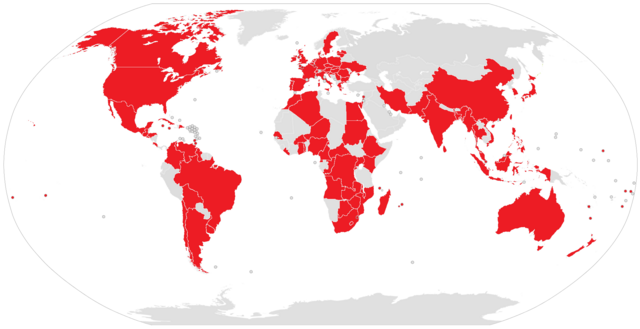Top Qs
Timeline
Chat
Perspective
World Communion of Reformed Churches
International Christian organization From Wikipedia, the free encyclopedia
Remove ads
The World Communion of Reformed Churches (WCRC) is the largest association of Reformed (Calvinist) churches in the world. It has 230 member denominations (227 members and three associate or affiliate members)[n 1] in 108 countries, together claiming an estimated 88 (considering only full members) to 100 million people,[1] thus being one of the largest communions in the world after the Catholic Church, the Eastern Orthodox Church, and the Anglican Communion.[2] This ecumenical Christian body was formed in June 2010 by the union of the World Alliance of Reformed Churches (WARC) and the Reformed Ecumenical Council (REC).[3]
Remove ads
Among the biggest denominations in the WCRC are the Church of South India, Presbyterian Church of East Africa, Presbyterian Church of Korea, Ethiopian Evangelical Church Mekane Yesus, Church of Jesus Christ in Madagascar, Federation of Swiss Protestant Churches, Protestant Church in Indonesia, Presbyterian Church (USA), Evangelical Church of Cameroon,and the Protestant Church in the Netherlands. Its member denominations on the whole could be considered more liberal than the member denominations of the International Conference of Reformed Churches or the World Reformed Fellowship, which are also large ecumenical Calvinist organizations.
Remove ads
History
Summarize
Perspective
The WCRC traces its origins to 1875, with several unifying Reformed organizations emerging in London, England.
After a two-day meeting ending on 1 February 2006, Douwe Visser, president of the Reformed Ecumenical Council, and Clifton Kirkpatrick, president of the World Alliance of Reformed Churches, said in a joint letter to their constituencies, "We rejoice in the work of the Holy Spirit which we believe has led us to recommend that the time has come to bring together the work of the World Alliance of Reformed Churches and the Reformed Ecumenical Council into one body that will strengthen the unity and witness of Calvinist Christians."
After first calling the potential body "World Reformed Communion", this was modified into "World Communion of Reformed Churches".
A Uniting General Council of the WCRC, bringing the organization into existence, took place from 18–26 June 2010 at Calvin College, located at Grand Rapids, Michigan, United States. The council focused on the "Unity of the Spirit in the Bond of Peace" mentioned in Ephesians as its main theme, setting a tone of true mutual understanding and acceptance amongst member churches and associates, laying aside differences and other issues as they embark on this shared journey with one another as each seeks to discern the will of God and continue their struggle for justice and peace in the world. The World Communion of Reformed Churches has not taken a position on the issue of homosexuality but includes denominations that affirm same sex marriage.[4]
Remove ads
Work
Summarize
Perspective
The 2010 Uniting General Council stated that the WCRC should be "called to communion and committed to justice." Its two main program offices are thus focused on these aspects, with theological work included with communion. The Theology and Communion office serves as coordinator for official dialogues with other religious organizations, organizes a bi-annual Global Institute of Theology, and brings Calvinist theological scholars together for various discussions. The Justice office promotes economic, ecological and human rights, basing much of its work on the Accra Confession, a statement adopted at the 2004 General Council of the World Alliance of Reformed Churches and re-endorsed at the 2010 Uniting General Council.
The WCRC also has a General Secretariat which includes the general secretary's office, the communications office and other organizational responsibilities. Through the General Secretariat, the WCRC promotes dialogue between churches, advocates for causes on a global scale and supports the activities of its member churches.
The global headquarters of the WCRC are located in Hanover, Germany, with a North American non-profit subsidiary based in Grand Rapids, Michigan. Originally based in Geneva, Switzerland, which played host to John Calvin and earned a reputation as the "Protestant Rome", the group's Executive Committee announced on 8 November 2012, that they would relocate the headquarters to Hanover, Germany, by December 2013, due to overbearing financial strains caused by the high value of the Swiss franc.[5]
Remove ads
Organization positions
Summarize
Perspective
Ordination of women
In 2017, WCRC published the Declaration of Faith Concerning Women's Ordination, in which it supports the practice of women's ordination and encourages its 42 member denominations that do not ordain women to change their position.[6][7][8] The National Presbyterian Church in Mexico and National Union of Independent Reformed Evangelical Churches of France protested against the declaration, while the Presbyterian Church of Chile abstained.[9]
Joint Declaration on the Doctrine of Justification
In the same year, WCRC became the 5th signatory of the Joint Declaration on the Doctrine of Justification, after the Pontifical Council for Promoting Christian Unity (of the Roman Catholic Church), Lutheran World Federation, World Methodist Council and Anglican Communion.[10]
Same-sex marriage
The WCRC has no official position on human sexuality. However, many of its member denominations promote same-sex marriage or bless same-sex unions, such as the Remonstrant Church, Spanish Evangelical Church, United Church of Canada, Uniting Church in Australia, Uniting Church in Sweden, United Church of Christ, United Church of Christ in the Philippines, Evangelical Church of the River Plate, Evangelical Church of Czech Brethren, Protestant Church in the Netherlands, United Protestant Church in Belgium, United Protestant Church of France, Union of Protestant Churches of Alsace and Lorraine, Protestant Reformed Church of Luxembourg, Dutch Reformed Church in South Africa (NGK), Polish Reformed Church, Reformed Church in Austria, Reformed Church in America, Swiss Reformed Church, Uniting Reformed Church in Southern Africa, Reformed Alliance, Church of Lippe, Evangelical Reformed Church in Germany, United Reformed Church, Presbyterian Church in Canada, Presbyterian Church (USA), Church of Scotland, Presbyterian Church of Wales, Uniting Presbyterian Church in Southern Africa, United Congregational Church of Southern Africa, Waldensian Evangelical Church and Waldensian Evangelical Church of the River Plate.[9]
Remove ads
Leadership and General Council
Summarize
Perspective
General Councils
Presidents
WCRC presidents are ordinarily elected for a term of seven years at every General Council:
General Secretaries
WCRC general secretaries are elected for seven years at every General Council (held septennially):
Setri Nyomi's term was a continuation of his term as general secretary of the World Alliance of Reformed Churches. Upon the conclusion of Chris Ferguson's term as general secretary in August 2021, the WCRC Executive Committee appointed a "Collegial General Secretariat" originally composed of the three executive secretaries: Hanns Lessing (Secretary of Communion and Witness, Evangelical Church of Westphalia), Philip Vinod Peacock (Secretary of Justice and Witness, Church of North India), and Phil Tanis (Secretary of Communications and Operations, Reformed Church in America).[13] They were joined in the Collegium by Muna Nassar (Secretary of Mission and Advocacy) in December 2022.[14] In 2023, Setri Nyomi was installed as interim general secretary, to serve until the 2025 General Council.[15]
Remove ads
Member churches
Summarize
Perspective

As of December 2024, the World Communion of Reformed Churches has 227 members and three associate or affiliate members:[16][17][n 1]
Member profile
- Presbyterians (39.43%)
- Continental Reformed (28.5%)
- Ethiopian Evangelical Church Mekane Yesus (13.49%)
- Others United and uniting churches (15.23%)
- Congregationalism (3.2%)
- Arminians (0.09%)
- Waldenses (0.04%)
- Moravians and Churches of Christ (0.02%)
Considering only full members of the World Communion of Reformed Churches, 39.43% of individual members are Presbyterians. The Continental Reformed Churches represent 28.50% of members and the United and uniting churches are 28.72%.
Among the united churches is the Ethiopian Evangelical Church Mekane Yesus. It is a denomination of Lutheran theology, with a synod of Reformed tradition.[239][240][241] This is the largest denomination members of communion. Alone, it represents 13.49% of members. The others united churches account for 15.23% of the members.
Among the smallest groups within the communion are Congregationalism, which represents 3.20% of members. The Waldenses are 0.04% of the members of the communion.
Arminians have historically not been considered part of the Reformed Tradition.[242] However, Arminian denominations represent 0.09% of individual members of the WCRC.
Other groups, such as Moravians and Churches of Christ together they represent about 0.02% of individual members.
Remove ads
Former members
In 2013 the WCRC received notice of disaffiliation from the Christian Reformed Churches of Australia, the Protestant Church of Reunion Island and St Andrew's Presbyterian Church.[243]
The Arab Evangelical Church of São Paulo was previously members of WCRC.[244] However, after 2015, the denomination joined the Brazilian Baptist Convention and left the WCRC.
Due to the WCRC's increasingly liberal stance, theologically conservative denominations left tit in the 2020s.
On June 22, 2023, the Evangelical Presbyterian Church approved a resolution by which it withdrew from the WCRC and reaffirmed that it would base its global relations with other Reformed churches on the more conservative World Reformed Fellowship.[17]
In February 2024, the Presbyterian Church of Chile also passed a resolution to withdraw from the WCRC.
In June 2024, the National Union of Independent Reformed Evangelical Churches of France also withdrew from the organization.[245]
Remove ads
See also
Notes
- The list of the World Communion of Reformed Churches lists the Evangelical Reformed Church of Lithuania twice, both in Lithuania and in the United States. Furthermore, Arab Evangelical Church of São Paulo, Evangelical Presbyterian Church (United States), Presbyterian Church of Chile and National Union of Independent Reformed Evangelical Churches of France, who have already left the organization, which is why the CMIR list reports 232 denomination Full members and three associate and affiliated members.
- member of the Reformed Alliance, which is already a member of the World Communion of Reformed Churches. Therefore, the number of churches and members of this denomination are not included in the total sum.
- member of the Protestant Church in Indonesia, which is already a member of the World Communion of Reformed Churches. Therefore, the number of churches and members of this denomination are not included in the total sum
- excluding numbers from the United Congregational Church of Southern Africa, Church of North India, United Church in Jamaica and the Cayman Islands, and United Reformed Church, which are already members of the World Communion of Reformed Churches.
Remove ads
References
External links
Wikiwand - on
Seamless Wikipedia browsing. On steroids.
Remove ads

